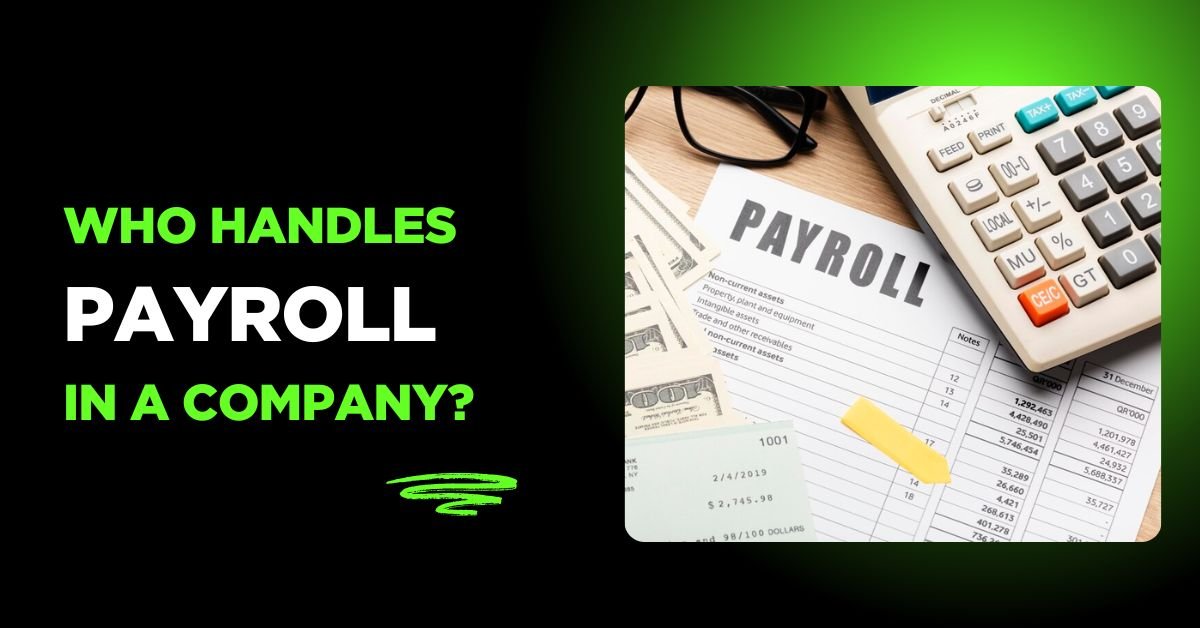Who Handles Payroll in a Company?
When we think about running a company, many things come to mind—like making products, selling services, or hiring people. But there’s one task that happens regularly and quietly behind the scenes: payroll. Payroll is the process of paying employees for the work they do. It may sound simple, but it’s actually one of the most important parts of running a business. So, who handles payroll in a company? Let’s explore this in detail.
What Is Payroll?
Payroll includes calculating employee salaries, deducting taxes, and making sure everyone gets paid on time. It also includes keeping records, filing tax documents, and managing benefits like bonuses, insurance, and retirement plans.
It’s not just about writing a check or sending a direct deposit. Payroll involves a lot of details and responsibilities, and any mistake can lead to unhappy employees or even legal trouble for the company.
Why Payroll Is So Important
Payroll is important for several reasons. First, it helps build trust between the company and its employees. People work to earn a living, so getting paid correctly and on time is crucial. If employees are paid late or incorrectly, they may become unhappy and leave the company.
Second, payroll involves taxes. Companies must withhold the right amount of income tax, Social Security, Medicare, and other deductions. If a business doesn’t handle taxes properly, it can get fined or even face legal problems.
Who Handles Payroll in a Company?
Now let’s answer the big question—who is responsible for handling payroll in a company? The answer depends on the size of the company and how it is organized. Let’s look at a few different cases.
1. Small Businesses
In small businesses, the owner or a manager often handles payroll. Since there may be only a few employees, the owner might use payroll software to keep things simple. Sometimes they do everything manually using spreadsheets.
However, even in a small business, payroll must follow strict rules. That’s why many small business owners use online payroll services to make sure everything is accurate and legal.
2. Medium-Sized Companies
As a company grows, payroll becomes more complex. In medium-sized companies, payroll is usually handled by the HR department (Human Resources) or a payroll specialist. These professionals are trained to deal with salaries, deductions, and employee records.
They use specialized payroll software and stay updated with the latest tax laws and regulations. This helps the company avoid mistakes and run payroll smoothly.
3. Large Corporations
In large companies, there is usually a dedicated payroll department. This department may have several employees, and each person has a specific job—like calculating hours, preparing paychecks, or handling tax filings.
Larger companies may also use an external payroll service provider to handle everything. These are professional companies that take care of all payroll tasks on behalf of the business. Outsourcing payroll helps reduce mistakes, save time, and improve efficiency.
4. Outsourced Payroll Services
Many companies, both big and small, choose to outsource payroll. This means they hire a third-party company that specializes in payroll processing. These payroll providers take care of everything—payroll calculations, tax deductions, compliance with laws, and even direct deposits.
Popular payroll service providers include ADP, Paychex, Gusto, QuickBooks Payroll, and others. Outsourcing payroll can save time and reduce the risk of errors. It’s a great option for businesses that don’t have an in-house team.
Who Is Involved in Payroll?
Even though one department handles most of the work, several roles may be involved in the payroll process:
- HR Managers: They handle employee information, like job titles, salaries, and benefits. HR also manages hiring, promotions, and terminations, all of which affect payroll.
- Payroll Specialists: These are professionals who focus only on payroll. They know tax laws, manage pay schedules, and ensure compliance.
- Accountants: They check that payroll matches the company’s budget. Accountants may also prepare tax reports and financial statements.
- Finance Department: In larger companies, finance teams work with payroll to plan and track expenses.
- Business Owners: In small businesses, the owner often handles payroll personally or oversees the process.
What Does a Payroll Specialist Do?
A payroll specialist is someone trained to handle all payroll-related tasks. Their job includes:
- Calculating employee hours and wages
- Applying deductions like taxes, health insurance, and retirement contributions
- Ensuring employees are paid on time
- Managing bonuses and overtime
- Filing payroll taxes with the government
- Preparing end-of-year forms like W-2s or 1099s
They must be detail-oriented and have good knowledge of tax laws and payroll systems. Many payroll specialists use software like ADP, Gusto, or QuickBooks to simplify their work.
Tools Used for Payroll
To make payroll easier, many companies use payroll software. These tools help automate tasks and reduce human error. Some of the most commonly used payroll tools include:
- QuickBooks Payroll
- ADP
- Gusto
- Paychex
- Wave Payroll
These platforms offer features like automatic tax filing, employee portals, time tracking, and direct deposit options. They are especially helpful for small businesses that don’t have a full payroll team.
Payroll Challenges
Handling payroll is not always easy. Some of the challenges include:
- Staying up to date with tax laws: Rules can change often. Companies must make sure they follow the latest laws to avoid penalties.
- Managing different pay structures: Some employees are paid hourly, some are salaried, and some may receive commissions or bonuses. Payroll must handle all types correctly.
- Handling benefits and deductions: From insurance to retirement plans, every benefit must be tracked and deducted correctly.
- Keeping records: Companies must keep payroll records for several years. Missing documents can lead to audits and fines.
Conclusion
So, who handles payroll in a company? It depends on the size and structure of the business. In small companies, the owner or a manager might do it. In medium and large companies, payroll is usually handled by HR, payroll specialists, or an outsourced provider.
No matter who does it, payroll is a critical part of any business. It ensures employees are paid fairly and on time, and it helps the company stay compliant with tax laws. Whether it’s done manually, through software, or with help from a payroll service, what matters most is accuracy, reliability, and trust.
Also Read:
- Does Payroll Fall Under HR or Finance?
- How to Do Payroll for a Construction Company?
- What Happens If a Company Can’t Make Payroll?
- Who Is Responsible If a Payroll Check Bounced?
- How to Reconcile Payroll?
Frequently Asked Questions
Who handles payroll in small companies?
In small businesses, the owner or a manager often handles payroll. They may use payroll software or simple spreadsheets to manage salaries, taxes, and employee payments. Sometimes they also hire external payroll services to help keep things accurate and legal.
What does a payroll specialist do daily?
A payroll specialist calculates employee wages, handles tax deductions, ensures correct payments, and files payroll reports. They also manage bonuses, time-off pay, and tax forms like W-2s. Their job is to make sure every employee is paid correctly and on time, without mistakes.
Why is payroll important in companies?
Payroll is important because employees depend on it for their income. It also ensures the company pays taxes and follows legal rules. Accurate payroll keeps employees happy and helps avoid penalties or legal trouble with the government due to mistakes in tax or payment records.
Can payroll be outsourced to another company?
Yes, many companies choose to outsource payroll to professional providers. These services manage everything—from employee paychecks to tax filings. It saves time, reduces errors, and helps the company stay compliant with labor laws and tax regulations. It’s a common choice for busy or growing businesses.
What tools are used to manage payroll?
Companies use payroll software like QuickBooks, Gusto, or ADP. These tools help calculate pay, deduct taxes, track hours, and send payments. They also create reports and file taxes automatically. These tools make payroll easier and help prevent errors that could cost time or money.


